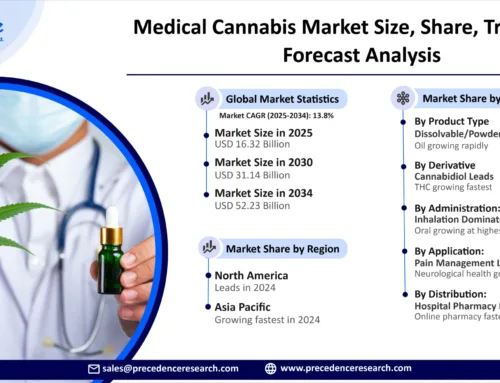Minnesota Governor, Legislative Leaders to Increase Cannabis Excise Tax in Budget
May 16, 2025
Minnesota’s elected officials indicated they plan on “right-sizing” the state’s adult-use cannabis industry by increasing an excise tax on sales, despite adult-use dispensary operations having yet to commence in the North Star State.
Democratic Gov. Tim Walz and party leaders in the state Legislature announced the tax hike on May 15 as part of their bipartisan budget agreement.
Minnesota House Speaker Lisa Demuth, R-Cold Spring, specifically mentioned the cannabis tax increase during a press conference when asked about where the legislative leaders’ commitment stood on not increasing taxes.
Demuth said their commitment to not increasing taxes on Minnesotans as a means to balance the budget remained important.
“When we look at the amount of taxes that Minnesotans have faced over the last few years, we wanted to make sure that Minnesota families could afford their lives,” she said. “We know that there are not across-the-board tax increases. There will be a small increase on the tax on cannabis, that is almost right-sizing it. It was very low. We were one of the very low-taxed states on cannabis. There will be an increase there.”
The specifics of the budget agreement were not available as of Thursday, and Demuth didn’t mention what the new cannabis excise tax rate would be. However, Kurtis Hanna, the director of government relations and public policy at Blunt Strategies, told Cannabis Business Times that he confirmed with a House staffer that the rate would increase from 10% to 15% under the current budget agreement.
A women-owned Minnesota cannabis consulting firm, Blunt Strategies helped craft adult-use legalization legislation under the MN is Ready campaign spearheaded by Partner Leili Fatehi in 2023.
Blunt Strategies is now calling on industry stakeholders and advocates to contact the governor and their legislators to oppose the tax increase, saying it would negatively impact accessibility and affordability to tested and regulated cannabis and hemp products.
The excise tax levied on cannabis sales is in addition to Minnesota’s general sales tax, which can range from 6.875% to as much as 9.88% in some cities.
“While the politics play out behind closed doors, our industry will bear the consequences—higher costs for consumers, fewer legal options and increased pressure on local entrepreneurs working hard to build Minnesota’s craft cannabis marketplace,” the firm posted on social media.
Under Minnesota’s adult-use law, House File 100, which Walz signed in May 2023, revenue generated from the excise tax is to be divided as follows:
- 20% will go toward local governments to help oversee a legalized marketplace; and
- 80% will be appropriated toward state costs, from funding the Office of Cannabis Management (OCM) to youth education, an expungement board, and employment and economic development, among other agencies and programs.
However, the excise tax revenue has yet to generate a single dollar in the adult-use market because the OCM has not commenced adult-use sales in the two years since Walz’s signing in what is shaping up to be the third-longest program rollout in the nation.
The OCM announced earlier this month that it will conduct a series of license lotteries beginning on June 5, starting with social equity and general applicants in three licensing categories: adult-use cultivators, manufacturers and vertically integrated “mezzobusinesses” (medium). The office is also planning to hold a lottery for aspiring social equity retailers on June 5, but a lottery for general applicants for dispensaries will be held at a later date this summer.
“The office has prioritized the review of applications for the license types necessary to successfully stage the market,” OCM Interim Director Eric Taubel said in the announcement.
While the office moves toward launching the market, a ruling from Minnesota Second Judicial District Court Judge Stephen L. Smith issued April 4, which ordered the OCM to hold a license preapproval lottery for 648 social equity applicants hoping to enter the state’s forthcoming adult-use marketplace, remains a threat for possible delay. The OCM canceled the preapproval lottery in December amid litigation.
Upon the eventual sales commencement, Minnesota’s adult-use cannabis industry could generate $100 million in annual excise tax revenue if the program matches the billion-dollar rollout seen in Missouri—a state with a similar population—in 2023. Under the 15% excise tax budget agreement announced this week, that’d be $150 million in revenue from a $1 billion market.
Walz and Demuth were joined by Minnesota House Speaker Emerita Melissa Hortman, D-Brooklyn Park, and Senate Majority Leader Erin Murphy, D-Saint Paul, in Thursday’s press conference. Democrats control the governorship and the Senate, while the House is split, 67-67, with neither party holding a majority.
While Senate Minority Leader Mark Johnson, R-East Grand Forks, participated in the budget negotiations, he did not sign the agreement nor attend the press conference. Johnson released a statement on May 15 saying that the budget agreement “falls short” of fixing policies that hurt small businesses.
Later on Thursday, Johnson held a separate press conference.
“I think we were concerned that Democrats are going to be going back to the taxpayers yet again after raising taxes by $10 billion and spending $18 billion over the last two years,” he said. “So, you see the tax targets that came out; there’s not a lot of revenue increases in there. We’re not excited about any revenue increases.”
Johnson also said, “We’re not done yet,” indicating that the budget agreement now faces conference committees, where legislators will further refine the proposal based on bipartisan priorities. This is where Blunt Strategies’ call on industry advocates to contact legislators to oppose the tax increase comes into play.
Through the bipartisan agreement announced this week, the budget proposal eliminates nearly half of a projected $6 billion deficit, Johnson said. The overall budget for the 2026-2027 biennium is expected to be around $66 billion or $67 billion, according to Minnesota Budget Director Ahna Minge.
Walz praised Minnesota’s bipartisan cooperation on the budget amid “partisanship and division” in Washington, D.C.
“This agreement will ensure Minnesota continues to be the best place in the country to raise a child, while responsibly addressing long-term structural budget challenges,” the governor said. “While we disagree on many things, every person in the negotiating room has the best interest of our state in mind.”
Search
RECENT PRESS RELEASES
Related Post


